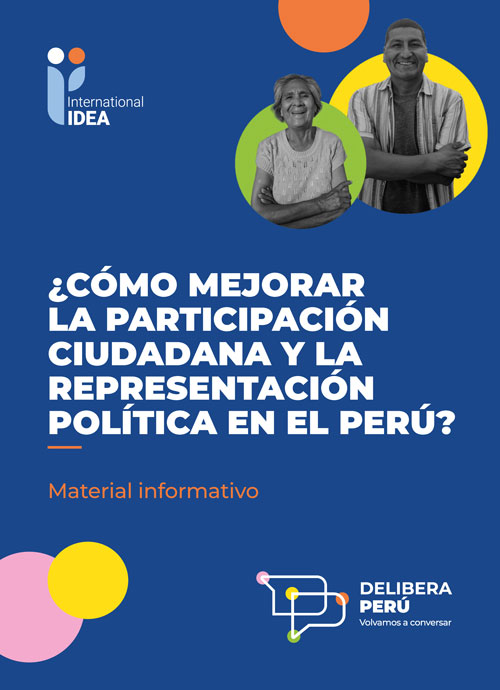La reunión bianual del Consejo y los eventos paralelos que se celebraron los días 23 y 24 de abril de 2024 reunieron a representantes de los Estados miembros y de los Estados observadores de más de treinta países para debatir los desafíos actuales a la democracia.
Search
Region
Country
Type
El Instituto Internacional para la Democracia y la Asistencia Electoral (IDEA Internacional) presentó el 30 de abril a los ministros europeos de los 27 Estados miembros de la UE las principales conclusiones de su documento político “Towards an enlarged Union: Upholding the rule of law”.
El Consejo de Estados Miembros de IDEA Internacional nombró cinco nuevos miembros de la Junta de Asesoría en su reunión del 24 de abril de 2024.
International IDEA’s Council of Member States appointed five new Members to the Board of Advisers at its meeting on 24 April 2024.
Marcela Ríos Tobar, Directora para América Latina y el Caribe de IDEA Internacional, desarrolló este lunes 22 de abril de 2024 una misión en la República Cooperativa de Guyana.
“What happens when suddenly people attack the integrity of the electoral process? Well, you actually need to have knowledge then because otherwise you are defenseless. If you know how elections work and how in many countries it's technically almost impossible to rig the election, then you will be protected against disinformation.”
Entre el 20 y el 21 de marzo de 2024, IDEA Internacional organizó un taller de hoja de ruta sobre el tema de la protección de los procesos electorales en el entorno de la información.
Between 20 and 21 March 2024, International IDEA organized a roadmap workshop on the topic of protecting electoral processes in the information environment.
Bengt Säve-Söderbergh, como secretario general fundador del Instituto Internacional para la Democracia y Asistencia Electoral, desempeñó un papel clave en el establecimiento de IDEA Internacional en febrero de 1995. Durante su mandato como primer secretario general, de 1995 a 2002, posicionó al Instituto a la vanguardia de la asistencia electoral, la igualdad de género y el apoyo a la democracia.
Serving as the founding Secretary-General of International Institute for Democracy and Electoral Assistance, Bengt Säve-Söderbergh played a key role in establishing International IDEA in February 1995. During his tenure as the first Secretary-General from 1995-2002, he positioned the Institute at the forefront of electoral assistance, gender equality, and democracy support.
The International Institute for Democracy and Electoral Assistance (International IDEA) and the Rule of Law Centre of Finland (RoL Centre), in partnership with the Central Election Commission of Bosnia and Herzegovina, recently hosted a regional discussion on Artificial Intelligence and Elections.
On 22 April 2024, the 50/50 Group Sierra Leone, with support from International IDEA held a National Level Dialogue to share findings from a post-election gender audit conducted on the 2023 elections.
Since technologies are not neutral, the principles underpinning digital technologies and their governance system are fundamental to protecting their capacity to foster, maintain and protect human rights.
India, the world’s largest democracy, has in recent years witnessed a significant transformation in political campaigning, particularly following the advent of digital media. Since 2014, there has been a noticeable surge in the use of social media for electoral campaigning and its appeal has continued to grow.
Marcela Ríos Tobar, Directora para América Latina y el Caribe de IDEA Internacional, participó esta semana de la Séptima Reunión del Foro de los Países de América Latina y el Caribe sobre el Desarrollo Sostenible, actividad que se llevó a cabo en Santiago de Chile.
On 17 of April 2024, the Rule of Law and Anti-Corruption (RoLAC II) Programme, implemented by the International Institute for Democracy and Electoral Assistance and funded by the European Union, hosted her first Project Steering Committee (PSC) Meeting. Central to the effective implementation of RoLAC II is the Project Steering Committee (PSC), which serves as a linchpin in the governance structure.
Electoral management in the United Kingdom is decentralised and largely delivered by local authorities with local government is a strong feature of governance and democracy. The national Electoral Commission was established in 2000 to provide advice and guidance on election administration and to regulate the financing of political parties.
level, the EU institutions have traditionally refrained from regulating political finance and electoral campaigns. Instead, this has largely remained the preserve of member states, which have very different political traditions and diverging regulatory regimes for campaign and party finances, including the digital and online aspects.
Data from the Perceptions of Democracy Survey (PODS) point to three broad findings. First, most people from a diverse array of countries around the world lack confidence in the performance of their political institutions and their access to them, and they are more dissatisfied than satisfied with their governments.
